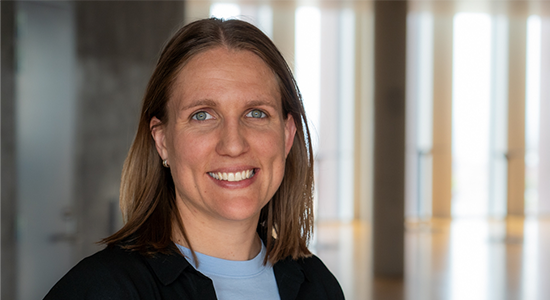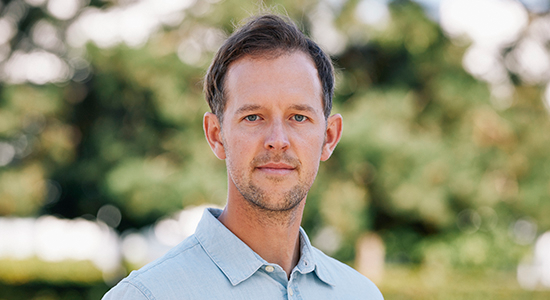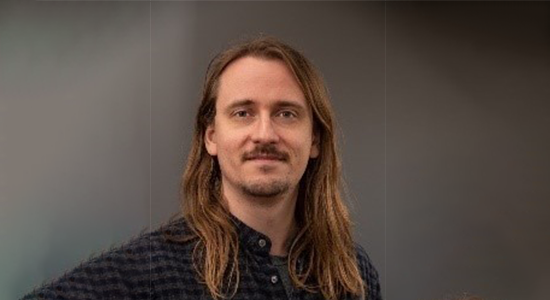MD, PhD
Assistant Professor at Department of Biomedical Sciences, UCPH
“As a medical doctor involved in both basic and human research, BRIDGE was, indeed, an excellent opportunity to explore translational research."
Alumni statements
Welcome to the alumni portrait series where we look what BRIDGE has meant for our alumni fellows.
Statement
“As a medical doctor involved in both basic and human research, BRIDGE was, indeed, an excellent opportunity to explore translational research. I started my scientific work in in vitro pharmacology and did a clinical PhD within the same field: pharmacological and physiological effects of the gut hormone GIP.
I was in the luxury position of having a job ready in general practice when BRIDGE advertised for their second round of fellowships. But we had also just established the opportunity of exploring the cardiovascular regulation of blood flow using novel MRI techniques, so I decided to apply and saw the curriculum as a great advantage of not only getting a two year-grant but also an opportunity to continue my scientific education. Since I was on my way to general practice, I had the clear opinion, that the BRIDGE Fellowship was the only possible postdoc position/grant. Luckily, I did not need to challenge that opinion, since I was granted the fellowship on 1 April 2020.
We started our fellowship during the corona pandemic. Even though half of our curriculum were “online from home”, the courses saved me from complete “lock down isolation” since I could always reach out to the fellows who were just as either frustrated, bored, or challenged by the pandemic restrictions. I agree with one of the fellows who always said that it was like belonging to a school class again and spending hours/week together with the classmates at the same level/mindset.
Both before, during and after BRIDGE, I have bridged between different research groups (e.g., biking a lot between Gentofte Hospital and University of Copenhagen or taking the underground tunnel to Rigshospitalet from the university). BRIDGE promoted the translational thoughts through the network of mentors and teachers, shared assignments, and choice of course themes. Expanding our knowledge on current, novel technologies by researchers willing to collaborate introduced me to the research community: we must collaborate, share, and support each other to solve all the difficult tasks relevant for, in our case, human health and disease.
The BRIDGE Office also evolves. As one of the first classes of fellows, we had suggestions for improvements of courses and planning and now that I follow the current fellows and have been part of one of the courses, I can see that some of our constructive suggestions have been implemented.
The fellowship period gave me time and opportunities to explore the possibilities of a research carrier and I applied for grants, was nominated for young investigator awards, and was successful. Compared with my medical doctor colleagues, who try to balance clinical work and research, I feel lucky that I could fully dedicate my time to explore ideas and possibilities for my future research field.
I see the completed BRIDGE as a quality seal on my CV. The application and interview process, the curriculum, the network, and of course the dedication to a translational research project of high quality, all prepared me for the next steps. I am now an assistant professor with a Novo Nordisk Foundation starting grant (NNF Emerging Investigator in Endocrinology and Metabolism 2023) and support from the Danish Independent Research Council (Inge Lehmann Programme 2022). I supervise 10 PhD students, am PI of my three first clinical studies, teach and plan new courses for medical students, and plan to continue my research carrier within the field of metabolic/endocrine research combined with methods from and medical specialist training in clinical physiology/nuclear medicine.
Of most importance to me is the engagement with the other BRIDGE Fellows. We are a growing family of alumni and current fellows that can share both challenges but also great results of our research “between fields”. I have encouraged several of the current fellows to apply and am part of the supervisor team of one of the newly recruited, and I will continue to follow and contribute to the programme in the future as well.”
Spring 2023
Statement
“As a researcher in human sperm physiology and fertility I have had a clear focus on the translation of findings from basic science (human sperm physiology) to clinical outcomes (human fertility) since the beginning of my PhD-studies. Having just identified a promising molecular lead for a non-hormonal male contraceptive in summer 2019, I considered applying to become a BRIDGE fellow, as I thought that BRIDGE would be the perfect venue for me to develop as an independent researcher, to set the best possible scientific team, and to further develop my project. At this point, I had just finished my MD PhD and clinical rotations (KBU) and was working on a temporary clinical assistant contract at Rigshospitalet. I was dreaming of becoming a full-time researcher, but everyone, including my former PhD-mentors, were advising me to pursue a medical specialization instead and then later aim to be a part time researcher beside the medical career, as the competition for research positions and grants is very high in Denmark. Luckily, I did not follow this advice, but applied for the BRIDGE Fellowship.
As expected, BRIDGE was very well suited both for me, a MD with a large interest in basic research, and for my project, as the core aim was to drive translational research projects from bench to bedside. Furthermore, I used the application process as a framework to assemble a team of skilled researchers in medicinal chemistry, pharmacology, ion channel electrophysiology, and human male reproduction to assist me with my drug discovery project. Now, after finishing the BRIDGE Fellowship, I have obtained more than 6 million DKK in research funding for the project from both Danish and international foundations, been able to hire several postdocs and use multiple students for various tasks in the project and have been granted the first patent based on this research. Although still far from getting a novel non-hormonal male contraceptive on the marked, I could not have taken the project this far without the support of BRIDGE.
With my background as a MD, the BRIDGE Academic Curriculum has filled several knowledge gaps within the fields of cell biology and translational medical research, made me up to date with the current state-of-the-art scientific methods, and introduced me to possible future basic research collaborators. Unexpectedly, my attendance in the academic curriculum also led to the establishment of two novel collaborative projects that have received full funding. The 1st collaborative project is on male epigenetic inheritance and was formed with metabolomic researchers Romain Barrés and Atul Deshmukh from the OMICS III and II courses, respectively. This project received funding in 2021 from the CBMR International Postdoctoral Program. The 2nd collaborative project is on the molecular regulation of CatSper and was formed with proteomic researchers Jesper V. Olsen and Tanveer Batth after attending their OMICS II course. This project received an IRFD Research Project 1 grant in 2022. Furthermore, BRIDGE has done a lot to promote my project via Twitter and LinkedIn. After the release of a video in relation to the inauguration of my 2020 BRIDGE fellowship group focusing on my male contraceptive project, I have received a lot of interest in my project from the media and have given multiple interviews to, e.g., the national Danish television broadcasters, radio, and newspapers/magazines. As a culmination of this interest, I was recently invited as a panelist for the UNFPA Nordic event with participation from HRH The Danish Crown Princess, the Danish Minister for Development Cooperation and Minister for Nordic Cooperation, the Deputy Executive Director of UNFPA, and the Dean of the Faculty of Health and Medical Sciences at the University of Copenhagen.
During the BRIDGE Fellowship, I not only had the luxury of devoting my time to my project and courses, but also to follow up on other new and ongoing collaborative projects. This meant that I went from being a junior postdoc with 11 peer-reviewed publications (7 first author, 0 last author) and a h-index of 5 (Web of Science) at the time I applied for a BRIDGE fellowship, to now being a new group leader at Rigshospitalet with 22 peer-reviewed publications (12 first author, 2 last author) and a h-index of 11 (Web of Science). My participation in BRIDGE has thus, without doubt, been instrumental in securing me a 3-year Lundbeckfonden Clinical Postdoc grant of 2.5 million DKK in 2022, which has enabled me to work full time as a researcher for the next 3 years.”
Spring 2023
Statement
“I applied and was accepted into the BRIDGE programme as part of the first group of fellows in 2019. Although there were no previous fellows to ask about their experiences, it became very clear to me that the vision from the BRIDGE leadership was exciting and different from any other postdoctoral opportunities I had come across – to nurture and develop the fellows to become independent research leaders and to adapt a true translational mindset for how science can impact the lives of patients.
As a medical doctor, many topics in the courses were new to me – from cutting edge molecular biology, model systems and drug development to leadership and communication. This was of course a major time investment but helped broaden my skillset and profile and to think outside the comfort zone of my own research field and projects. I have since spoken with many potential applicants, to whom I usually say: "If you prefer to work alone and commit yourself only to your project, I do not recommend applying – the courses, networking, and events are a significant time investment, but if you are serious about a translational research career, all of that will help you immensely in the long run”. For me, the skills I developed in my fellowship have been instrumental in working in interdisciplinary projects and collaborating with industry to promote clinical implementation of new scientific results.
BRIDGE has also helped me as a steppingstone to launch a full-time research career in a hospital setting, where most other doctors of similar age struggle with 20-50% research on top of their extensive clinical duties. This has allowed me to grow a large professional network and take part in many international collaborations. I have now secured a permanent position as senior researcher in my hospital-based research institution and attracted 4.4M DKK in project funding in the past year. I am currently applying for starting grants, one of which is under evaluation, and I aim to form my own group and recruit PhD students in the coming years. Hopefully, in the future I will have the chance to co-mentor a BRIDGE Fellow in an exciting interdisciplinary translational project.”
Spring 2023



